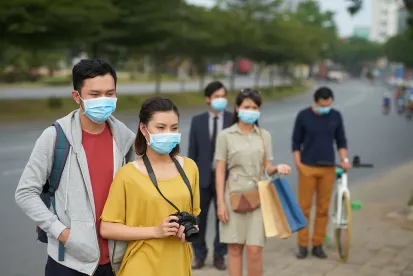In response to supply concerns due to Coronavirus Disease 2019 (COVID-19), the Trump administration has tightened export controls on U.S. medical supplies and personal protective equipment (PPE). According to a statement from the White House, the United States will now detain certain export shipments of PPE at the border and evaluate on a case-by-case basis whether they should be returned for domestic use. Certain shipments of PPE may be exempted from the new measures, including exports to Canada and Mexico. The new restrictions became effective April 10, 2020.
Restrictions on PPE Exports
On April 3, the president issued a statement expressing concern about price gouging and diversion of PPE from domestic suppliers for use abroad, as well as a “Memorandum on Allocating Certain Scarce or Threatened Health and Medical Resources to Domestic Use.” The Memorandum authorized the Secretary of the Department of Homeland Security (DHS), through the Administrator of the Federal Emergency Management Agency (FEMA) to “allocate for domestic use” certain items previously designated as “scarce” by the Department of Health and Human Services (HHS) on March 25. The Memorandum applies specifically to five of the 15 categories of medical supplies designated by HHS:
|
1) |
|
N-95 Filtering Facepiece Respirators; |
|
2) |
|
Other Filtering Facepiece Respirators; |
|
3) |
|
Elastomeric, air-purifying respirators and appropriate particulate filters/cartridges; |
|
4) |
|
PPE surgical masks; and |
|
5) |
|
PPE gloves or surgical gloves. |
These five categories of PPE were subsequently named in the April 7 Temporary Final Regulation (TFR) issued by DHS/FEMA, which allows U.S. Customs and Border Protection (CBP) to temporarily detain shipments pending an evaluation and determination by FEMA. As of April 7, 2020, all qualifying exports of PPE are being detained at U.S. ports of exit.
While detained, FEMA will evaluate the shipments and take one of the following proscribed actions: 1) order the items returned for domestic use; 2) issue a Defense Production Act (DPA)-rated order and purchase the items for use by the U.S. government; or 3) allow some or all of the export.
The TFR gives FEMA discretion in making its determination. In addition to allowing FEMA to consult other agencies, the rule calls for FEMA to consider the “totality of the circumstances” when making a determination using the six factors listed below:
|
1) |
|
The need to ensure that scarce or threatened items are appropriately allocated for domestic use; |
|
2) |
|
Minimization of disruption to the supply chain, both domestically and abroad; |
|
3) |
|
The circumstances surrounding the distribution of the materials and potential hoarding or price-gouging concerns; |
|
4) |
|
The quantity and quality of the materials; |
|
5) |
|
Humanitarian considerations; and |
|
6) |
|
International relations and diplomatic considerations. |
Five categories of PPE are currently subject to the FEMA order. However, other items designated by HHS, including ventilators, may become subject to similar export restrictions.
Exceptions to the Export Restrictions
The TFR contains one exception for “U.S. manufacturers with continuous export agreements with customers in other countries since at least January 1, 2020, so long as at least 80% of such manufacturer’s domestic production of covered materials, on a per item basis, was distributed in the United States in the preceding 12 months.”
In addition, on April 9, 2020, CBP issued a guidance memorandum to its Field Operations Directors indicating that CBP efforts will focus on commercial shipments of PPE valued at $2,500 or more and containing more than 10,000 units of the specified commodities. Further, the CBP guidance memo establishes exceptions for certain categories of shipments, listed below, that are not incorporated into the TFR. As such, it remains to be seen whether such exceptions will be applied consistently or further revised:
-
Exports to Canada or Mexico
-
Exports by or to U.S. Government agencies
-
Exports by U.S. charities
-
Exports by critical infrastructure industries for worker protection
-
Exports by the 3M Company
-
Express or mail parcels under the “commercial” thresholds
-
In-transit shipments
Practical Considerations
The practical impact of this rule on detained shipments remains to be seen. For example, it is not yet known how long the FEMA/CBP review process will take, and whether the exceptions outlined above will be applied uniformly. Because exporters of the enumerated categories of PPE may experience delays in exports, they may consider alerting end-users and customers accordingly. In addition, exporters of other types of PPE and medical devices may face heightened scrutiny and delays, as FEMA examiners and customs agents may inspect exports of COVID-19-related items.





 />i
/>i
